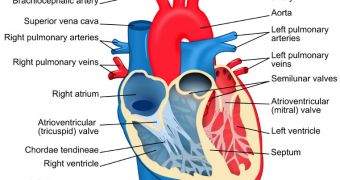According to an extensive review of specialty literature, it would appear that people who are more pessimistic and grouchy tend to recuperate slower if they are suffering from heart problems.
The researchers behind the investigation are quick to point out that these conclusions are not meant to make people doubt or try to change who they are.
Rather, they are addressed to recovery specialists. These experts should in the future accompany their therapeutic approaches with behavioral therapy, which may actually increase patients' chances of survival, and expedite their recovery.
The investigation was conducted by scientists at the Tilburg University in the Netherlands, who were led by medical psychology professor and study researcher Johan Denollet.
The conclusions of the new investigation mostly apply to individuals with Type D personalities. They are characterized by anxious and secretive behavior, and are pessimistic and irritable from birth.
Exhibiting these traits was not directly related to people developing heart conditions, but their presence was connected to the speed with which people recuperated from such diseases.
Additionally, it was discovered that people with Type D personalities were a lot more likely to experience relapses in their conditions, unlike people with other personality types.
“A lot of these people keep these emotions built up for a long time, in addition to chronic stress, which can be harmful to the cardiovascular system,” the team leader said for MyHealthNewsDaily.
One of the main reasons why this correlation exists is the fact that people who are very stressed out tend to lead a sedentary lifestyle, and also to pick up nasty habits, such as smoking and drinking.
Individuals of this personality type are also a lot more likely to exhibit conditions such as elevated blood pressure and chronic inflammation.
The investigators peered over the results of 49 past studies, which covered some 6,000 patients between themselves. The researches aimed at analyzing participants' heart and psychological health.
“It's not just enough to give patients cholesterol medications or put in stents, and it may not even be enough to have them jog and eat better,” says Barry J. Jacobs.
He is a clinical psychologist at the American Heart Association (AHA).Details of the new study were published Tuesday, September 14, in the the latest issue of the journal Circulation: Cardiovascular Quality and Outcomes.

 14 DAY TRIAL //
14 DAY TRIAL //